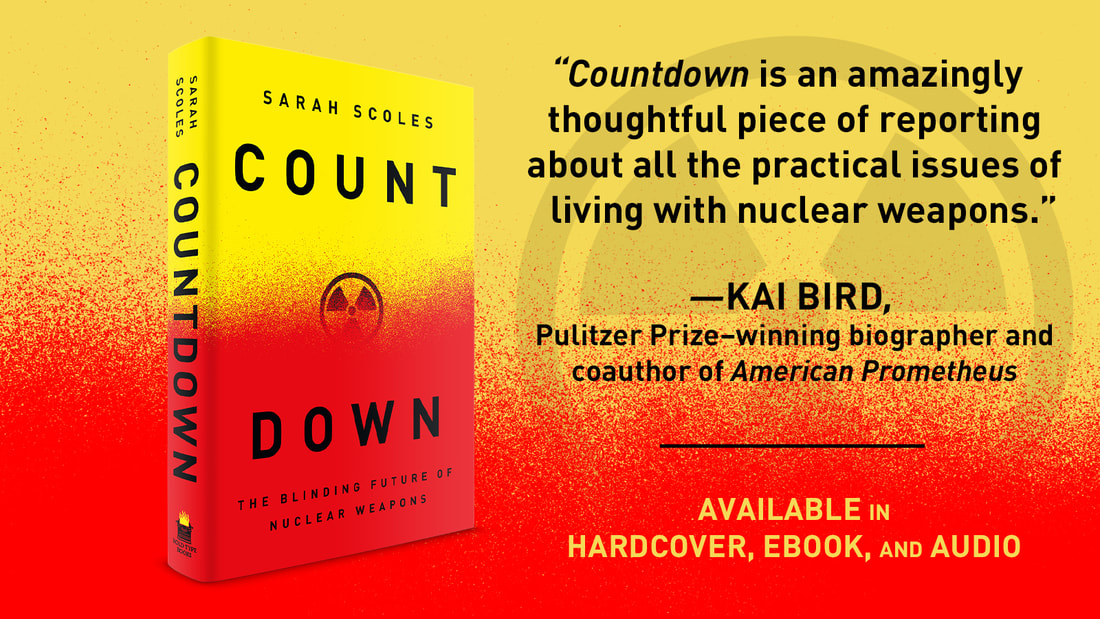
You can pre-order with the publisher, Bookshop.org, Barnes & Noble, Amazon, or wherever else you get books.
More reviews at the New York Times, the Wall Street Journal, the Economist, and Foreign Affairs.
"Everything you ever wanted to know about the current nuclear-weapon landscape."
- Kirkus, starred review
"Readers on both sides of the debate will find much to ponder."
- Publishers Weekly
"A book chronicling the stewards of our deadliest weapons of war becomes, at times, the story of people at quiet war with themselves."
- Scientific American
"Its great strength is in letting the scientists who do this work - many of them women - speak for themselves, as they wrestle with moral quandaries and imagine the consequences of their stewardship of the US nuclear arsenal."
- Science
"Pulling back the curtain on our nuclear weapons program."
- Santa Fe New Mexican
Listen: KQED Forum, Colorado Public Radio, Science Friday
"In the 21st century, most of us tend to comfortably forget that clock has never stopped ticking on human development of nuclear weapons since their deadly war-time beginning. Sarah Scoles's Countdown is an indispensable guide to a little seen history and a wonderfully human introduction to the often unheralded scientists who work to keep us safe - so that we can comfortably forget."
- Deborah Blum, Pulitzer-prize winning author of The Poison Squad
Conversations about nuclear weapons generally happen in past or future tense, skipping straight from Oppenheimer and the Manhattan Project to an as-yet-unrealized apocalypse. In Countdown, science journalist Sarah Scoles uncovers a different atomic reality: the nuclear age’s present.
Drawing from years of on-the-ground reporting at the nation's nuclear weapons labs, Scoles sheds light on the scientists who work on these bombs and those who work to limit their potential destruction. Investigating the science, technology, philosophy, politics, culture, and motivation of the modern atomic era, Scoles interrogates the idea that having nuclear weapons keeps us safe, deterring attacks and preventing radioactive warfare. She deftly lays out the existing nuclear apparatus in the United States, taking readers beyond the news headlines and policy-speak to reveal the state of nuclear-weapons technology, as well as how the current generation of U.S. nuclear weapons scientists have come to think about these bombs and the idea that someone, someday, might use them.
Through a sharp, surprising, and undoubtedly urgent narrative, Scoles brings us out of the Cold War and into the twenty-first century, opening readers' eyes to the true nature of nuclear weapons and their caretakers while also giving us the context necessary to understand the consequences of their existence, for worse and for better, for now and for the future.
More reviews at the New York Times, the Wall Street Journal, the Economist, and Foreign Affairs.
"Everything you ever wanted to know about the current nuclear-weapon landscape."
- Kirkus, starred review
"Readers on both sides of the debate will find much to ponder."
- Publishers Weekly
"A book chronicling the stewards of our deadliest weapons of war becomes, at times, the story of people at quiet war with themselves."
- Scientific American
"Its great strength is in letting the scientists who do this work - many of them women - speak for themselves, as they wrestle with moral quandaries and imagine the consequences of their stewardship of the US nuclear arsenal."
- Science
"Pulling back the curtain on our nuclear weapons program."
- Santa Fe New Mexican
Listen: KQED Forum, Colorado Public Radio, Science Friday
"In the 21st century, most of us tend to comfortably forget that clock has never stopped ticking on human development of nuclear weapons since their deadly war-time beginning. Sarah Scoles's Countdown is an indispensable guide to a little seen history and a wonderfully human introduction to the often unheralded scientists who work to keep us safe - so that we can comfortably forget."
- Deborah Blum, Pulitzer-prize winning author of The Poison Squad
Conversations about nuclear weapons generally happen in past or future tense, skipping straight from Oppenheimer and the Manhattan Project to an as-yet-unrealized apocalypse. In Countdown, science journalist Sarah Scoles uncovers a different atomic reality: the nuclear age’s present.
Drawing from years of on-the-ground reporting at the nation's nuclear weapons labs, Scoles sheds light on the scientists who work on these bombs and those who work to limit their potential destruction. Investigating the science, technology, philosophy, politics, culture, and motivation of the modern atomic era, Scoles interrogates the idea that having nuclear weapons keeps us safe, deterring attacks and preventing radioactive warfare. She deftly lays out the existing nuclear apparatus in the United States, taking readers beyond the news headlines and policy-speak to reveal the state of nuclear-weapons technology, as well as how the current generation of U.S. nuclear weapons scientists have come to think about these bombs and the idea that someone, someday, might use them.
Through a sharp, surprising, and undoubtedly urgent narrative, Scoles brings us out of the Cold War and into the twenty-first century, opening readers' eyes to the true nature of nuclear weapons and their caretakers while also giving us the context necessary to understand the consequences of their existence, for worse and for better, for now and for the future.